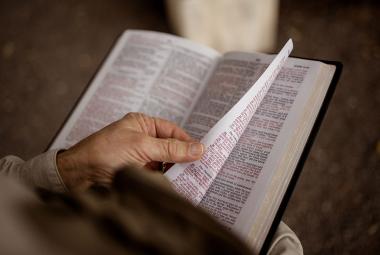Here is a book of the Bible which is among the least studied and the most emotionally controversial. It’s a book with only 117 verses and 470 Hebrew words,1 yet it is among the most difficult and mysterious books in the entire Bible. It’s a book about lovemaking from an author who had 700 wives and 300 concubines.2
Scholars differ widely on the structure of the Song of Songs, its unity or lack of it, the nature of its metaphors, and the nature of the love extolled by the Song. Probably no other book of the Bible has such a variegated tapestry of interpretation.
There are those who feel that this lyric poem deals only with the subject of Biblical lovemaking, and a number of books focus on this aspect.3
The love relationship between a man and a woman—the courtship, the wedding night, and the subsequent sexual adjustments of the young couple—are all fruitfully treated. So explicit are these aspects that because of its erotic content, the rabbis forbade the book to be read by anyone under the age of 30.
Indeed, of all the many books on marriage that are available in Christian and secular bookstores, none of them can possibly improve on the Biblical teaching found in this Song of Songs.
Here is romantic love for married couples that exceeds our greatest dreams and expectations. Here is a manual on sex that beats all secular viewpoints on how a man and a woman should make love.
The secular world has drowned us with its encouragements toward illicit affairs, easy divorce, glories of promiscuity and joys of adulterous relationships. While critical of Christian viewpoints, it has done nothing to improve our marriages or satisfy the longings of our hearts. The exploitation of sex—and the disavowal of marriage and the family itself in our culture—has sown the wind and we now are reaping the whirlwind.
This book is intended to improve dying or empty, boring marriages; to increase your love for your spouse; and, to illuminate true sexual and romantic understanding...but there’s more.
Is it Inspired?
Rabbi Akiba, the leading rabbi of the Bar Kochba revolt (132-135 A.D.) is quoted in the Mishnah:
In the entire world there is nothing to equal the day on which the Song of Songs was given to Israel. All the writings are holy, but the Song of Songs is most Holy.4
(Due to his support, all questions about the place of the Song of Songs in the canon of the Scriptures were silenced.) This book is inspired; it was part of the Scriptures when Jesus Christ was here on the earth. He put His imprimatur on the entire volume when He said, “...the Scripture cannot be broken” (John 10:35b). Some say that it is not quoted in the New Testament, yet there are fragments everywhere.5 It is an extremely difficult book to teach because it is so personal. It needs to be. And like a diamond, it has many facets, and each one reveals a unique beauty.
Allegorical Views
Jewish tradition (the Mishnah, the Talmud, and the Targum) viewed the book as an allegorical picture of the love of God for Israel.6
Church leaders, including Hyppolytus, Origen, and Jerome, have viewed the book as an allegory of Christ’s love for His bride, the Church.7 John the Baptist, the last of the Old Testament prophets, recognized Christ as the Bridegroom,8 as Christ Himself also claimed.9 Paul goes even further.10
It is interesting that God always seems to use the marriage as the idiom of intimacy with Himself, from Adam’s love for Eve, Boaz’s role in taking Ruth as a Gen-tile bride, Hosea’s taking unfaithful Gomer, et al.
It is also significant that in this most intimate of books, there are lessons that go far beyond the art of lovemaking itself!
Notes:
1. Forty-seven of which appear only in this book.
2. 1 Kings 11:1-4.
3. J e r e m i a h ,Fruchtenbaum, Hocking, et al.
4. Mishnah Yadaim 3:5.
5. “The well of living water” (Jn 4); “the veiled woman” (1
Cor 11); “the precious fruit” (Jas5:7); “the spotless bride” (Eph 5:27);
“unquenchable love” (1 Cor 13:8); “love strong as death” (Jn 15:13);
“ointment poured forth” (Jn 12:3); “draw me” (Jn 6:44); “the Shepherd
leading His flock” (Jn 10:4, 5, 27); “fruits of righteousness” (Phil 1:11).
6. Israel is, indeed, portrayed as the “wife” of Yahweh
in Hosea, Ezekiel, et al. Cf. Isa 49:18; 61:10; 62:5; Joel 2:16.
7. So H.A. Ironside, Hudson Taylor, et al.
8. John 3:29.
9. Matthew 9:15.
10. Ephesians 5:22-32.






